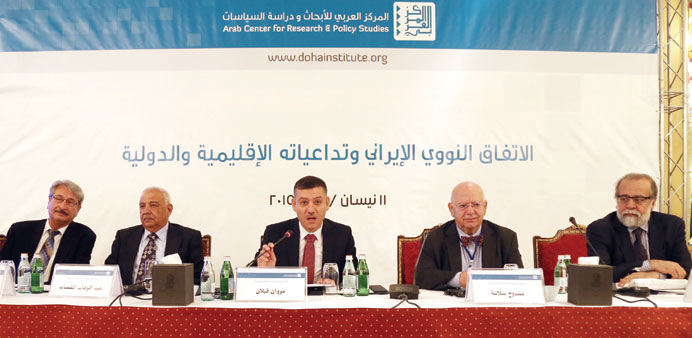By Peter Alagos
Business Reporter
A large group of speakers and subject matter experts gathered in Doha to discuss regional and global repercussions of the Iranian nuclear agreement in a forum held at the Ritz-Carlton Hotel yesterday.
Entitled “The Iranian Nuclear Agreement: Regional and Global Repercussions,” the forum was organised by the Arab Centre for Research & Policy Studies (ACRPS) following the announcement of the framework agreement between Iran and the P5+1 countries in Lausanne, Switzerland, on April 3.
The P5+1 is a group of world powers namely, China, France, Russia, the UK, and the US, which are permanent members of the UN Security Council. The other country is Germany. In 2006, these countries joined the diplomatic efforts with Iran with regard to its nuclear programme.
The ACRPS said, “The framework agreement has brought more than 12 years of intense international debate surrounding Iran’s nuclear programme to a close.
“The panellists will address the effects of the framework agreement on the balance of power within Iran’s domestic political scene, as well as its impact on the region and the world at large.” The centre added, “This agreement is a political watershed, which rules out the prospect for greater developments related to Iran’s nuclear capabilities. It will also impinge on the balance of powers within the Iranian regime, echo in the country’s relations with global powers, and inevitably have repercussions of no lesser significance on the regional arena.”
The speakers in yesterday’s workshop included ACRPS general director Azmi Bishara, Iraqi nuclear scientist Imad Khadduri, oil market consultant Mamdouh Salameh, ACRPS researchers Abdulwahhab al-Qassab and Marwan Kabalan, Hagop Kevorkian professor Hamid Dabashi, Saudi Arabian researcher Khaled al-Dakheel,
Brookings Institute Foreign Policy fellow Ibrahim Sharqieh, Jordanian researcher Fatima Smadi, Georgetown University School of Foreign Service in Qatar assistant professor Birol Baskan, ACRPS associate researcher Mahmood Muhareb, Qatar University Humanities department chair Mahjoob al-Zweiri, and columnist and author Camelia Entekhabifard. The ACRPS also said while the framework agreement guarantees Iran’s right to enrich uranium within its borders, it also stipulates that Iran will abandon 98% of its present stockpile of enriched uranium, decommission two-thirds of its centrifuges, restrict enrichment activities to the reactor at Natanz, and convert all other facilities to research labs. In return, international sanctions imposed on Iran will be lifted.
“Even if sanctions were lifted today, it will take Iran more than two years to deploy the enhanced oil recovery (EOR) technology and try to increase production. Even then it might only succeed in limiting the fast depletion in its oilfields rather than increasing production,” said Salameh in his presentation entitled “Oil and Iran’s Nuclear Programme: Impact on Oil Prices and the Global Oil Market.”
He added that for the past 15 years Iran was unable to meet its Opec (Organisation of the Petroleum Exporting Countries) production quota of 4mn barrels per day (mbpd).
“My view is that even if the sanctions are lifted and Iran was able to import the latest American oil technology, Iran could add no more than 200,000 to 300,000bpd to its production but even this may not translate into added exports because of the steeply-rising domestic consumption,” Salameh stressed.
He added, “As a result, lifting the sanctions against Iran will hardly affect the global oil prices or the global oil market against a projected growth in global demand estimated at 913,000bpd in 2015 and 1.13mbpd by 2016, according to the International Energy Agency.”

Panellists at the forum entitled u201cThe Iranian Nuclear Agreement: Regional and Global Repercussions.u201d PICTURE: Jayan Orma
